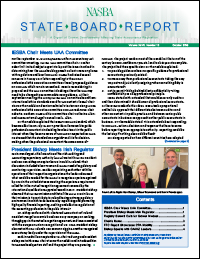SHARE: For the September 12-13 AICPA/NASBA Uniform Accountancy Act Committee’s meeting, NASBA UAA Committee Chair J. Coalter Baker (TX) invited subject experts to lay out the issues involved in determining how the UAA should approach a client’s noncompliance with regulations and laws (NOCLAR). NASBA had raised several concerns in its May 2017 letter responding to the AICPA’s Professional Ethics Executive Committee’s (PEEC) proposed guidance on NOCLAR, which remain unresolved. PEEC is reconsidering its proposal and the UAA Committee is looking at how the UAA may need to be changed to accommodate new guidance. At their September meeting, the AICPA/NASBA UAA Committee heard from: International Ethics Standards Board for Accountants (IESBA) Chair Stavros Thomadakis and Senior Technical Director Ken Siong; AICPA Professional Ethics Executive Committee NOCLAR Task Force Chair Robert E. Denham; NASBA Ethics Committee Chair Catherine Allen; and NASBA External Legal Counsel Noel L. Allen. Dr. Thomadakis explained that IESBA’s NOCLAR standard, which became effective on July 15, 2017, provides a framework to guide professional accountants in deciding how best to act in the public interest when they become aware of NOCLAR or suspected NOCLAR. He stressed that the standard was a “guide” and it is for decision-making when the professional accountant “becomes aware of” NOCLAR. The project was born out of the scandals at the turn of the century (ENRON, WorldCom, Tyco, etc.) and took six years to complete. The project had three specific aims, Dr. Thomadakis explained:
IESBA started with a standard that would cover only auditors and then determined it should cover all professional accountants, as the IESBA’s code of ethics does. IESBA took a proportional and holistic approach that differentiates between auditors and other accountants in public practice, and between senior public accountants in business as opposed to other public accountants in business. Dr. Thomadakis stated: “It is a standard about responding to NOCLAR – actions, decisions and response that have to come before reporting to an appropriate authority. Reporting would be the last step if nothing else could be fixed.” Mr. Siong reported on how different countries have adopted the NOCLAR standard as developed by IESBA. The first adopter was South Africa. Scotland adopted it in November 2017. Australia adopted it on January 1, 2018 and they are waiting for formalization of whistleblowing legislation this fall to then have it go into effect in 2019. Japan has taken a stepped approach with auditors in public practice being covered as of July 2018 and those in business in 2019, but with no disclosure allowed. The IESBA speakers listed the following countries as a sample of the global adopters/considerers of their NOCLAR standard:
Other countries will follow what is done in the United States, Mr. Siong said. “Disclosure was at the heart of the debate: When should a public accountant override the duty of confidentiality and disclose NOCLAR to an appropriate authority? Balance is important,” he observed. While many in the regulatory community felt disclosure should be a requirement, the IESBA determined that “confidentiality can be set aside in certain circumstances.” Factors weighing on that decision include:
PEEC NOCLAR Task Force Chair Robert Denham summarized differences between the IESBA’s standard and the 2017 PEEC exposure draft. Among those are: The PEEC standard would apply to all members regardless of the type of service provided or the member’s employment. Also, the IESBA standard directs the professional accountant to consider further action (which may include withdrawal and disclosing to an appropriate authority even where there is no legal or regulatory requirement to do so), but the PEEC draft only addresses withdrawal. The PEEC exposure draft does not recommend communication to the external auditor, but the IESBA standard allows such communication. Mr. Denham noted an objection raised to adopting the IESBA’s standard that would cover non-audit services was: “Clients may view confidentiality of the non-attest work product as paramount and choose non-CPA service providers over CPA service providers.” Dr. Thomadakis commented: “The issue of competition of non-accountants and accountants… this is a difficult line to walk down. I think it is a slippery slope.” “Our goal is to get to a good answer working together,” NASBA Ethics Committee Chair Catherine Allen told the UAA Committee. She cautioned the UAA Committee that this is “a tricky balancing act,” but confidentiality needs to be looked at. “We have the IESBA blueprint and hearing how other countries are addressing the standard is helpful.” Ms. Allen’s discussion of the key elements of NOCLAR can be found on www.nasba.org. Accountant-client privilege is a creature of some states’ law, but is not recognized federally, NASBA legal counsel Noel Allen told the UAA Committee. He found 17 states to have some form of privilege and 14 to have other protections that do not purport to be “privilege.” Eight states have language favorable to NOCLAR disclosure. Mr. Allen recommended the UAA Committee review Section 18 of the UAA . NASBA UAA Committee Chair Baker believes the UAA Committee will need time to address all of the issues involved in coming to a practical solution for NOCLAR. In addition, he and AICPA UAA Committee Chair Thomas Neill will be working with PEEC to make sure the groups’ efforts are coordinated. For example, would standards need to be changed to permit enhanced communications between the predecessor and successor auditors. One UAA Committee member commented that by simply resigning from a client when NOCLAR appears to exist, is the profession just continuing to play “kick the can” – and leaving it to someone else to protect the public? |
Related NewsFull Issue |
- MEMBER CENTER
- EXAMS
- LICENSURE
- EDUCATION

